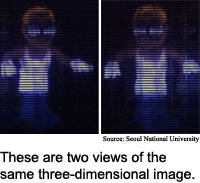
3D display goes vertical
Researchers from Seoul National University
in Korea have devised a method that widens both the horizontal and vertical
viewing angles of three-dimensional integral imaging systems, which use
the clustered-lenses arrangement of insect eyes.
Although flies-eyes-arrays can provide high-quality three-dimensional
pictures and don't require special viewing aides like polarization glasses,
they tend to have a narrow viewing angle -- about 20 degrees.
The researchers previously widened the horizontal viewing angle
using a system of fast mechanical shutters that blocked all but the appropriate
portions of a three-dimensional image for a given angle. Their latest method
is non-mechanical, and thus less prone to wear, and it increases the viewing
angle both horizontally and vertically. The method uses a beam splitter
to produce two, overlapping displays.
The beam splitter separates images into two opposite polarizations,
one of which is used to widen the horizontal angle and the other the vertical.
The system switches between the two polarizations faster than the eye can
detect, creating a single, three-dimensional image that has twice the viewing
angle of the original.
The technique could be used in simple applications like three-dimensional
advertising displays within two years, and in three-dimensional TV systems
in a decade, according to the researchers. The work appeared in the June
16, 2003 issue of Optics Express.
Sensors guard privacy
Cheaper optics-chip link on tap
Logic clicks with ratchet
Electricity shapes nano plastic
News briefs:
Experience handed across Net
3D display goes vertical
Gel yields nanotube plastic
Nano toolbox gains carbon cones
Jolts mix micro fluids
Jet-laser tandem prints gold

Research Watch blog
View from the High Ground Q&A
How It Works
RSS Feeds:
News
Ad links:
Buy an ad link
Ad links: Clear History
Buy an ad link
|
TRN
Newswire and Headline Feeds for Web sites
|
© Copyright Technology Research News, LLC 2000-2010. All rights reserved.